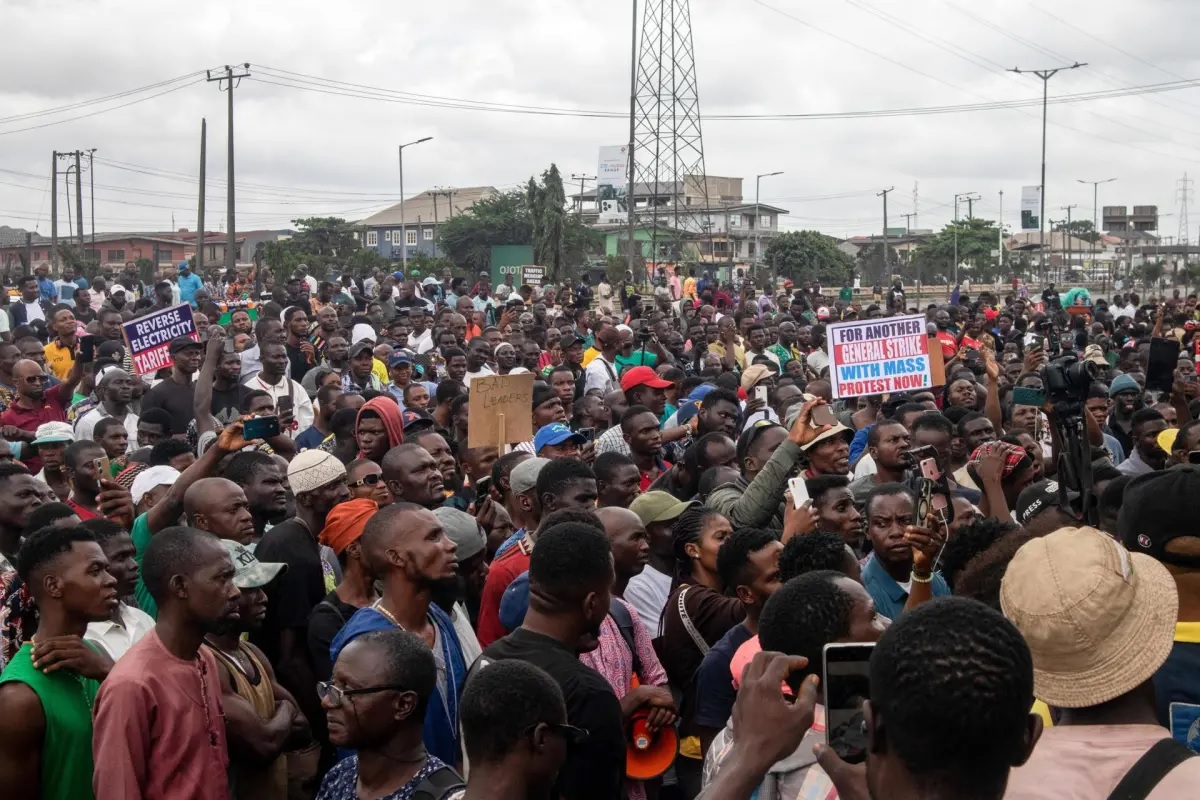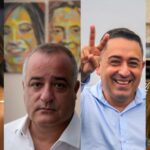
“One day, the poor will have nothing to eat but oppressive millionaires,” “General strike now” and “Down with bad government” are some of the slogans that can be read on the posters accompanying the protests that have been sweeping across Nigeria since Thursday.
As in other African countries, such as Kenya and Uganda recently, Thousands of young people took to the streets to protest. Youth is the one who suffers the most increasing precariousness and unemployment, high cost of living, record inflation in the country and the end of subsidies resulting from the implementation of IMF plans.
At least 13 people were killed by the brutal repression deployed during the first day of protests in several cities across the country.
Police 🇳🇬 in Nigeria puts all its units on red alert and sounds out the help of the military after #EndBadGovernanceInNigeria protests turned violent in some cities, leaving at least three people dead, the inspector general of police Kayode Egbetokun says.
Despite evidence that… pic.twitter.com/FHrinEcwPJ
— Kennedy Wandera (@KennedyWandera_) August 2, 2024
Amnesty International had recorded more than a dozen deaths in the first hours of the protests.
Amnesty International condemns the killing of peaceful protesters by security personnel across the country:
1. Suleja Niger state 6 people killed
2. Maiduguri 4 people killed
3. Kaduna 3 people killed— Amnesty International Nigeria (@AmnestyNigeria) August 2, 2024
Schools, banks and markets remained closed amid the protests, which took place in cities including the capital, Abuja, and the country’s main commercial city, Lagos.
The “day of rage” also saw youths demonstrate in the city of Maiduguri, while in Kano, the country’s second-largest city, protesters set fire to tyres outside the state governor’s office and police cracked down with tear gas.
This Friday the protests continued and the initial demands were added to the punishment of those guilty of the repression. and Thursday’s killings. In Lagos, youths gathered at Gani Fawehinmi Park, surrounded by heavily armed police and armoured vehicles.
Day 2.
One Voice.
Whether you’re an Online or on ground protester, you have to speak up!!
If the country better, na for all of us.#EndBadGovernace!! pic.twitter.com/2dvHjoRrUS
— Oyiga Micheal (@Nsukka_okpa) August 2, 2024
The protests were called by an informal coalition of groupsDespite the repression, the groups agreed to continue the demonstrations that were originally planned to last 10 days.
Day 2: Market women in Ibadan, Oyo state join the #EndBadGovernanceInNigeria protests, declaring “Enough is enough! pic.twitter.com/DIFeDHhhmw
— Take it back Movement (@TIBmovement) August 2, 2024
Another failure of the IMF’s plans
In February last year, Nigeria elected as President Bola Tinubu. Tinubu came from the ranks of the ruling party but He promised change with a shock policy that was supposed to end the economic crisis that drags the country.
He The plan demanded by the IMF to carry out this “shock therapy” was the liberalization of the exchange market and the elimination of subsidies. to oil and energy. This only served to shoot up the cost of livingwhich has increased since President Bola Tinubu came to power in May 2023, and accelerate inflation which reached an all-time high of 33.95 percent in June.
While wages remain frozen, the rising commodity prices like rice, corn and yams, has made them impossible to acquire for the majority.
President insists that changes are necessary to keep the country afloat and He has asked for “time” for the reforms to “take effect and improve the economy”.

But, Inspired by protests in Kenya in June that led the government to backtrack on a law that eliminated subsidies and increased taxes, Nigerians decided not to give Tinubu and the IMF plans any more time, and took to the streets in a protest movement called #EndbadGovernanceinNigeria (Out with bad government in Nigeria).
These protests, which were mostly unemployed or precarious young peopleoccur after a series of strikes which were carried out last year due to the emergency increase in wages in the face of inflation.
The fourth strike since Tinubu took office took place in early June. The main unions held a general strike with power cuts and airport blockades to demand a substantial increase in the minimum wage (from 20 to 333 dollars) in the face of the highest inflation in 30 years.

Nigeria is the most populous country in Africa (more than 213 million inhabitants) and also one of its main oil producers, as well as one of the largest economies on the continent. However, Many of the country’s 200 million people are self-employed, informal workers or unemployed.. That’s why, Four out of ten Nigerians live below the poverty line.
Inflation is, in fact, one of the causes of the malnutrition crisis in the northern states of the country, which has led to an “extraordinary increase in admissions of severely malnourished children with potentially fatal complications,” Médecins Sans Frontières (MSF) warned in June.
Young people had already led the 2020 #EndSARS protests against police brutalityover abuses by the SARS anti-robbery squad, which escalated into the largest anti-government protests in modern Nigerian history.
Today’s, which follow those carried out in Kenya, They promise to put the Government and the IMF’s adjustment plans in a difficult position which are wreaking havoc not only in Nigeria but in most African countries, demanding brutal adjustments to continue paying a fraudulent debt.
Source: www.laizquierdadiario.com

